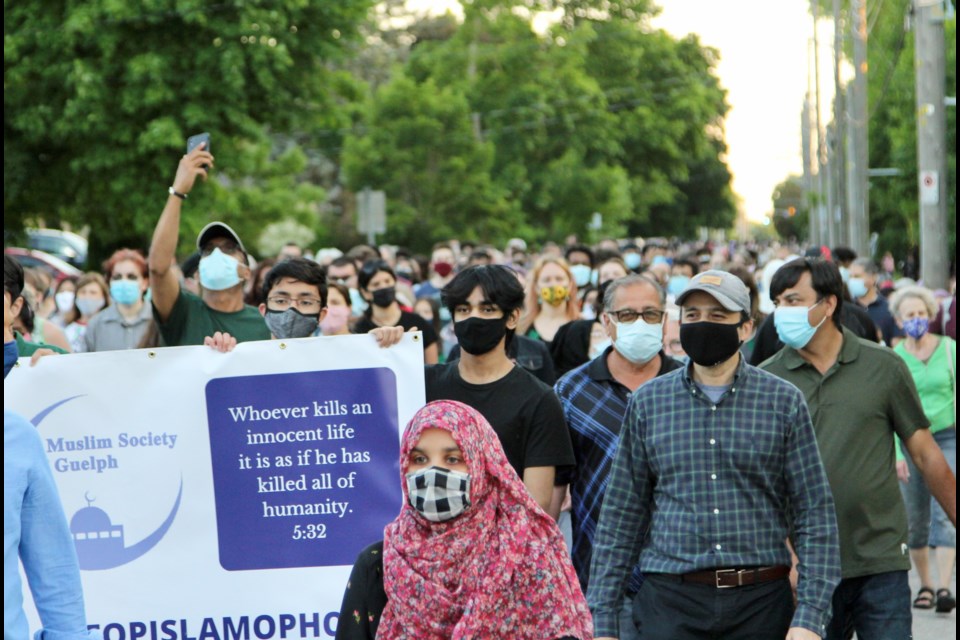The London tragedy happened over 100 km away, but its effects could be felt in Guelph.
“The Afzal family could have been anyone in this community,” Sara Sayyed of the Muslim Society of Guelph as she spoke to over 1,200 people who attended the mosque’s vigil and walk on Thursday to remember the family lost to what police are calling a hate-motivated car attack.
“Assaulted while in a shopping mall parking lot, attacked while on public transit, killed while praying in a mosque, murdered while taking a walk. This has become the reality of Muslims across Canada.”
Sara said the MSOG has spent the last six years building bridges with the Guelph community but still needs to do more because racism and discrimination are still very prevalent in the community in different forms.
“I can’t think how many times I’ve gone out or sent my kids out with their grandparents. The thought that they might not come back. What if something may happen to them when I’m not around and something happens to me, who would care for them?” she said in tears.
“It’s something I can’t shake and it shouldn't be what any of us think of.”
The vigil drew people of all ages, faiths and race to show solidarity for the Muslim community. Several of those in attendance brought plants to fill up a community memorial garden the MSOG created for the Afzal family.
The large crowd walked from Water Street to Royal City Park chanting 'Islamophobia has got to go’ and ‘Muslims are here to stay' as cars honked and people waved from their windows.
The crowd paused and participated in a moment of silence at the Gordon Street and Wellington Street intersection to remember the tragic event that took place in a similar intersection in London. The March ended with an evening Maghrib prayer at Royal City Park.
Attendees at the event wore pins with #OurLondonFamily on them while others wore green felt squares to show solidarity against Islamophobia, a form of action that began after the Quebec shooting in 2017.
“These issues that we face today are real. They are a reality,” said Imam Mubeen Bhatt as he spoke to the crowd at the vigil.
“We’ve been indoctrinated over time to have issues of racism or an intolerance to another person based on their faith,” he said, giving the example of his own children who are fourth-generation Canadians yet still get called ‘brownie’ in school. He stressed that racism begins at home and if fourth-generation Canadians hear these words, it’s worse for first-generation Canadians.
Bhatt said when one is indoctrinated with hate and breeds ideology of hate, that's when the problem becomes external.
“Now your hate is being expressed like it was expressed when a family was gone for a walk,” said Bhatt.
Mary Bellai, 78, has lived beside the Muslim Society of Guelph building for 60 years. She said she would often bring her grandchildren on the mosque’s property to play and praised Guelph’s Muslims for being incredible neighbours.
“There's no way that could in any way describe it or justify it,” said Bellai about the London incident as she broke into tears.
“It hit everybody. Everybody with children, families, good people who attend their services. We can hear it in our house and it’s a beautiful sound.”
Melody Soares, a student at the University of Guelph at the vigil said when she first heard of the incident, she was disappointed but not surprised.
“Unfortunately ideologies like this exist everywhere,” said Soares.
“The deepest darkest corners of hate, they really encourage one person acts like mass shootings and the car attack in Toronto so this is not very surprising but devastating to hear when it happens,” said Soares.
Soares said it was important for her to come to show solidarity for Muslims. “I wanted to come for that little boy who lost his entire family,” she said.
Sayyed reminded the community to call out discrimination when one sees it in any form.
“Call out racism when you see it. Call out xenophobia where you see it. Call out any type of hate, anti-Black, anti-Indigenous, homophobic, everything,” said Sayyed.
“There are too many people that are still in power that support systemic racism, a system of policies that won't let us change. We need to do all that we can to have the calls for action. Donate, vote, talk to your council. Write the letters, write the emails, tweet, whatever it takes. We need to call this out, we need those people out and we need the people who are willing to make the change in.”
